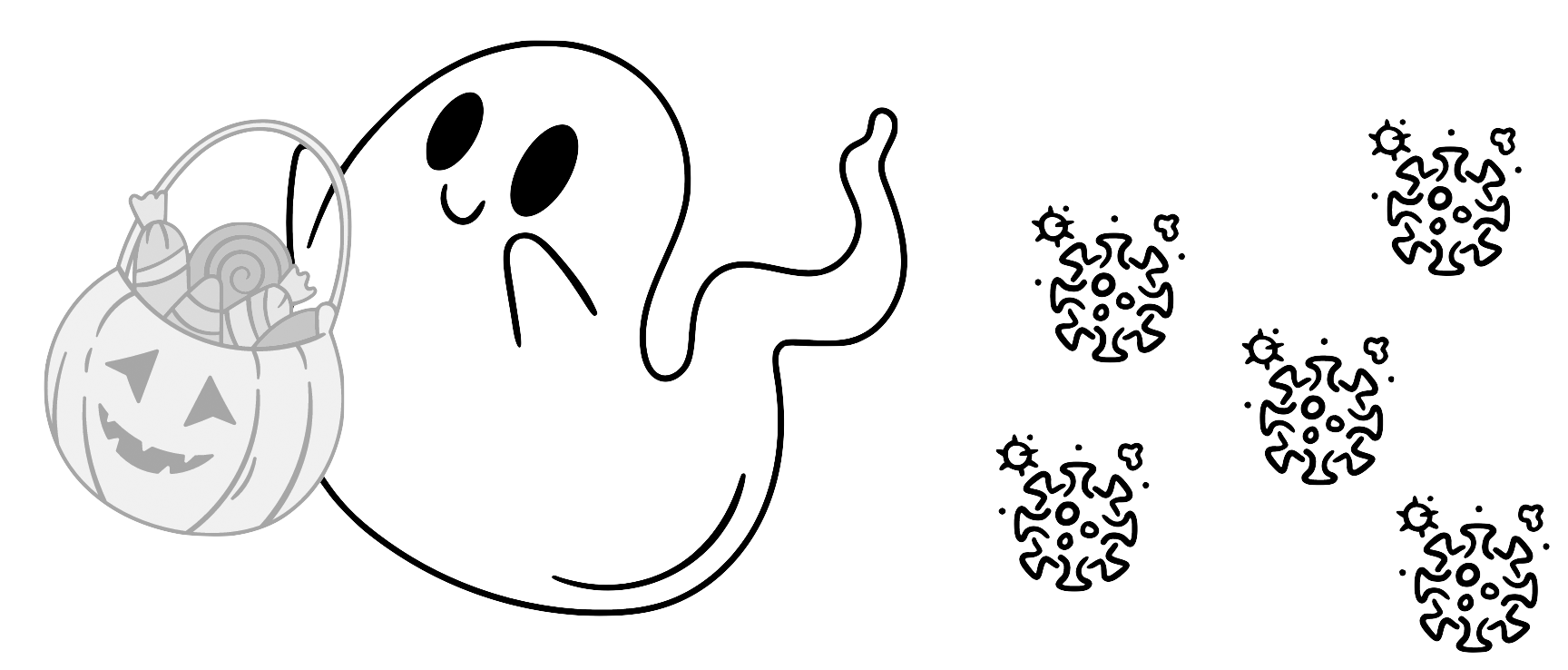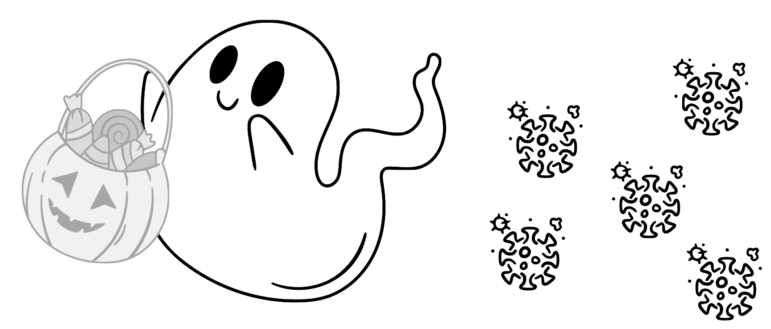
Halloween often reminds people of kids in intricate makeup and eccentric costumes running around the block, knocking from door to door as they hold out their orange Halloween trick-or-treating candy baskets ready to yell “Trick or treat!” At least, that was what people pictured before the pandemic.
In 2020, the COVID-19 pandemic limited Halloween celebrations. According to the National Opinion Research Center at the University of Chicago, there was a 37% decrease in people who attended Halloween parties in 2019. Additionally, there was a 32% increase in people who did not celebrate Halloween in 2020.
Last year, senior Jazene Sacramento and her friends dressed up and celebrated a socially distanced Halloween outside at a park, a stark contrast to the Halloween party she went to the year before.
“[Two years ago], everything in the room … was … fully decorated,” Sacramento said. “There [were] spider webs, bats and cool paper mache stuff. There [were also] lanterns, fairy lights [and] pumpkins all over the place with candles. We [had] Halloween music [and movies] playing in the background.”
Before the pandemic, senior Leo Thompson attended Halloween parties organized by his church.

“They gathered … middle schoolers [and] high schoolers [and] encouraged people to wear costumes,” Thompson said. “People [brought] snacks, food [and] some mini games.”
Sophomore Alexis Martinez hosted Halloween parties pre-pandemic and also enjoyed adding her own flavor and style when decorating.
“I would usually set up … fog bubble machines, put up blow up mummies [and put out] pumpkins,” Martinez said. “Outside we would have stations of games … and then food [and] drinks.”
This year, Sacramento intends on going to a sleepover, watching movies and trick-or-treating with her friends despite the pandemic. With loosening restrictions and increased vaccination rates, the question of assuming some risk becomes topical.
“We’ll stay safe [and] wear [our] masks inside still. I just want to spend Halloween with my friends”
“I’m leaning towards that risk because … I’m vaccinated [and so are all my friends],” Sacramento said. “We’ll stay safe [and] wear [our] masks inside still. I just want to spend Halloween with my friends and have fun [and] not have this Halloween be really boring.”
While Thompson isn’t too keen on going trick-or-treating this year, he does plan on dressing up and celebrating Halloween in his own way.
“I’m past the age where I’d want to do trick-or-treating,” Thompson said. “I’m still gonna wear costumes with … my family. [If there are] any parties or [even] the [Halloween rally] that they’re hosting [at Aragon], I’ll probably try and participate in those.”
Deciding whether to go trick-or-treating or not this year is a tough decision to make. While most people are vaccinated, there is still a lot of uncertainty surrounding whether or not accepting food from strangers is safe.
“I feel like [trick-or-treating this year is] kind of unsafe,” Sacramento said. “Especially in this situation [with] the delta variant and … people [not being] vaccinated, [people] shouldn’t take … open[ed] candy … or food from strangers because there’s a possibility that … it can harm … others.”
Just 12% of U.S. households went trick-or-treating last year, as opposed to the 24% in 2019. This was likely due to the uncertainty and lack of safety surrounding COVID-19 at the time. This year, according to Dr. Anthony Fauci, it is safe enough for vaccinated individuals to enjoy trick-or-treating, which may lead to a rise in the number of Halloween celebrations in comparison to 2020.
“I don’t think we’re going to be able to have a normal Halloween until [the pandemic is] actually over”
Halloween being on a Sunday may interfere with some students’ celebration plans of trick-or-treating, staying over with friends or having late parties as they will have to go to school the very next day. People may have to cut their plans short or even give up on the idea of having late evening to night parties.
“It sucks that [Halloween is] on a Sunday because then we have school the next day,” Martinez said. “I probably have to leave early and start early.”
Even after already celebrating Halloween during the ongoing pandemic, there is still a lot of uncertainty around the safety of Halloween.
“I don’t think we’re going to be able to have a normal Halloween until [the pandemic is] actually over or close to over,” Martinez said.
An increase in vaccination rates allows for some students to feel comfortable celebrating while maintaining a degree of caution when in large groups.
“I think that for people who have taken the vaccine [it’s] automatically … safe enough, but I know that … with large scale celebrations, [there are] a lot of people involved, [and there could be people that] either haven’t taken the vaccine or aren’t following regulations very well so I’m unsure,” Thompson said.
While this is the second Halloween impacted by the pandemic, the celebrations might be less limited than last year. In the future, Halloween may be uninhibited by safety restrictions and return to the normalcy of pre-pandemic life.




